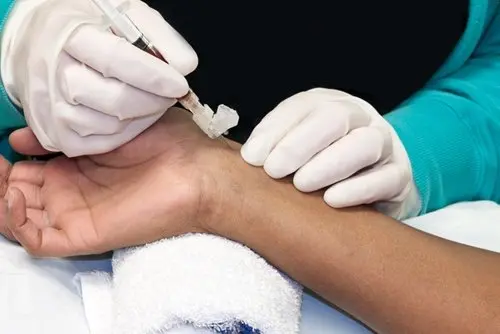One of the tests most frequently recommended by a GP is a laboratory blood test. You can learn a lot about your general health and what is currently going on in your body. Blood tests can detect cancer early, recognize inflammation even when it is not showing immediate symptoms, and obtain a huge amount of important medical information.
To get a reliable measurement, you come for a blood test in the morning, before you eat your first meal. An overnight fast ensures that the analyzes do not falsify the elements and substances that enter the body in food, causing various reactions. Taking a blood sample for testing is not unusual and shouldn’t cause negative associations, but it happens that some people are really afraid of it. The pain associated with inserting a needle through the skin layer into a vein close to the surface in the flexion of the arm is slight and can be compared to a mosquito bite, which we usually do not even feel (unlike the burning sensation that occurs after the annoyed insect has already found its way). drinks … fortunately blood donation doesn’t end this way).
Where do the prejudices come from regarding venous blood collection for testing? It seems that they are related to the perception of the human body as a finite and closed whole, surrounded by an impenetrable barrier of the skin, protecting and isolating the interior from the surrounding world. Blood sampling violates this order by externalizing the fluid that comes from inside the human body. The soreness of the sting is not as troublesome in itself as the awareness that a certain part of the blood has left the body, in addition through the needle – an external foreign body that has breached the skin barrier.
Blood Collection – Blood Donation: Rules
A special form of blood donation is the donation to a blood bank in order to save human life. Then, first we have to do a traditional blood test by taking a small amount of it in order to assess whether we can become a blood donor. Even perfectly healthy people immediately after vaccinations, cosmetic and medical procedures, as well as women under the influence of hormones (during menstruation or pregnancy) cannot donate blood. This is due to the content of various factors that could turn out to be dangerous for the recipient. Blood transfusion itself is a heavy burden for the body, therefore blood drawn from donors must be of the best quality, which is to guarantee high safety of the process.
To donate blood, you must be at least 17 years of age (in this case, the written consent of the parents is required until the age of 18) and weigh at least 50 kilograms – because 450 milliliters of blood are taken from a donor at one time, which must not exceed 10% of all blood in the body . The entire process takes about an hour, but the blood collection itself takes only 10 minutes. All the rest of the time is a qualifying examination and paperwork, and finally a short recovery rest.
Honorary blood donors are entitled to various social benefits – for example, free or discounted travel in the means of transport, and even … free supply of medicines. However, to obtain the status of an honorary or distinguished blood donor, you must donate a minimum of 5 liters (women) or 6 liters (men) of blood. The card of the Honored Honorary Blood Donor may be issued by the Polish Red Cross. It is the basis for free pharmaceutical treatment, primarily in the field of medicines necessary to donate blood.
Taking blood for tests – what to do to avoid pain?
First of all, it is worth to properly hydrate the body, thanks to which the veins will become more visible, and the person taking the blood will have no problem with the injection (which will definitely save us pain). On the day before the test, you can also take one of the herbal sedatives – the evening dose will no longer affect the results, and at the same time will help to control the fear of drawing blood.
For individuals who are particularly sensitive to pain (which may be related to, for example, depression), it is possible to anesthetize the skin before taking blood. There are preparations with lidocaine available on the pharmaceutical market, the use of which a few hours before the planned injection will make it virtually imperceptible. Therefore, if we cannot imagine the experience of collecting blood for laboratory analysis, we can ask the doctor who gives the referral for such a test to prescribe an anesthetic cream (it is available only with a prescription).










